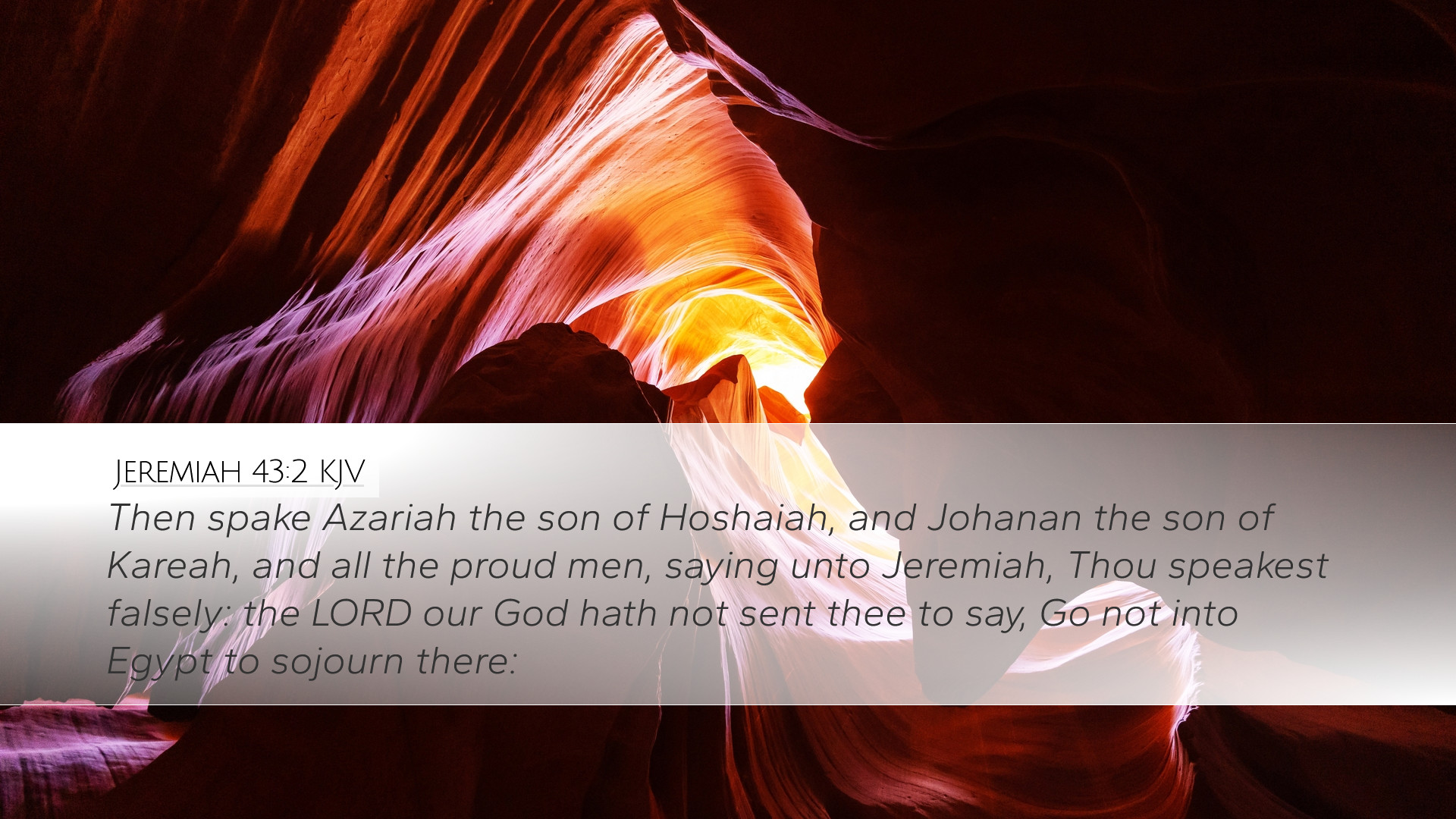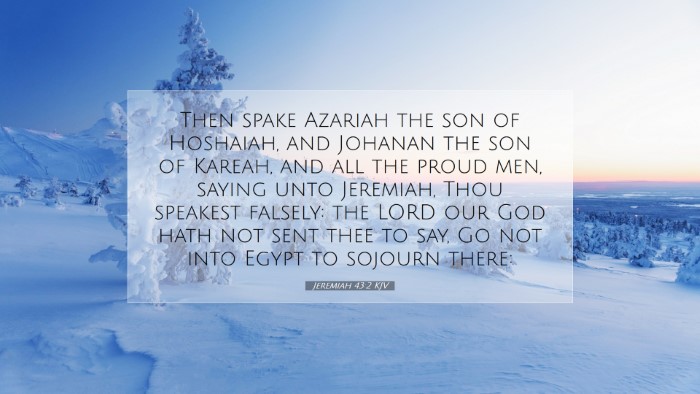Commentary on Jeremiah 43:2
Jeremiah 43:2 states: "Then spake Azariah the son of Hoshaiah, and Johanan the son of Kareah, and all the proud men, saying unto Jeremiah, Thou speakest falsely: the LORD our God hath not sent thee to say, Go not into Egypt to sojourn there."
This verse occurs in a critical juncture of Jeremiah's prophecy, where the attitudes and actions of the people, particularly their leaders, reveal their rebellion against God's guidance through the prophet.
Contextual Overview
The backdrop of this passage is the aftermath of the Babylonian conquest, during which the remnant of Judah is faced with the decision of whether to remain in their homeland or flee to Egypt for safety. The people had just witnessed the destruction of their temple and the devastation of Jerusalem, and the temptation to seek refuge in Egypt arose.
Exegesis and Analysis
1. The Confrontation of Prophecy
In this verse, we see a powerful confrontation between Jeremiah, the prophet of the Lord, and the leaders of the people. Matthew Henry identifies this interaction as one where human pride clashes with divine authority. The leaders, particularly Azariah and Johanan, embody skepticism towards God's word through the prophet.
2. The Role of the Prophet
Jeremiah's position as a prophet was to speak the truth of God, regardless of popular opinion. Albert Barnes emphasizes the weight of Jeremiah's responsibility, suggesting that true prophets often encounter hostility when their messages contradict the desires of the audiences they address. Jeremiah's warning against entering Egypt was a divine imperative, not a personal opinion.
3. Character Analysis of the Leaders
The leaders' proclamation, calling Jeremiah a liar, reveals a profound disdain for divine instruction. Adam Clarke suggests that their pride and arrogance blind them to the truth. The proud men of Judah were unwilling to submit to God's will and instead relied on their own understanding, believing that safety lay in Egypt.
4. Implications of Resistance
This rejection of prophetic warning has severe implications. Matthew Henry highlights that rejecting God’s guidance may lead not only to physical peril but also to spiritual destruction. Literature from this period, particularly in the prophetic books, often stresses the cyclical nature of Israel's disobedience and its consequences.
Theological Themes
- God's Sovereignty: This verse showcases the ultimate authority of God in guiding His people, contrasting with human wisdom.
- Pride vs Humility: The proud leaders serve as a case study in pride’s folly in denying God's truth.
- The Nature of False Prophecy: This passage raises questions about the criteria for true versus false prophecy, stressing the importance of discernment.
- Fear and Trust: The people's inclination toward Egypt illustrates a lack of trust in God's provision and protection.
Historical and Cultural Insights
Understanding the socio-political landscape of ancient Judah is critical for interpreting this passage. The allure of Egypt was significant, as it was viewed as a land of resources and relative safety. However, Albert Barnes argues that Egypt represented not only a geographical refuge but also a return to pagan influences, which God sought to distance His people from.
Pastoral Application
For pastors and church leaders today, this passage serves as a sobering reminder of the importance of adhering to God's word in the face of opposition. As Jeremiah exemplifies steadfastness, modern ministers are called to remain true to God’s call, even when it is unpopular or meets with skepticism.
1. Upholding Truth in Leadership
Leaders must be vigilant against the voices of pride that would urge them to compromise their beliefs.
2. Fostering Discernment Among Believers
Encouraging congregants to recognize and resist narratives that contradict God’s guidance is vital for spiritual health.
Conclusion
Jeremiah 43:2 serves as a poignant reminder of the conflict between divine guidance and human pride. The interactions between Jeremiah and the leaders of Judah reveal the dangers inherent in turning away from the counsel of God. As this ancient narrative unfolds, it beckons us to remain steadfast in our faith and to uphold the truth of Scripture in our communities.


